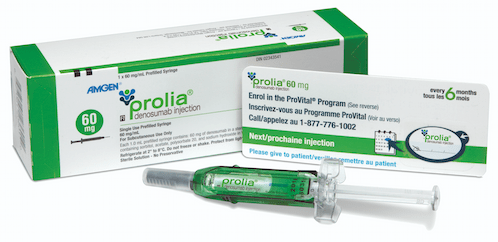About Prolia®
Prolia (denosumab injection) is used to treat osteoporosis (thinning and weakening of the bone) in women after menopause, who have an increased risk for fractures or cannot use other osteoporosis medicines, or for whom other osteoporosis medicines did not work well.
Prolia (denosumab injection) is also used to increase bone mass in men with osteoporosis at high risk for fracture.
About Prolia®
One in four women and one in eight men have osteoporosis – and many may not even know it. Known as the “silent thief,” osteoporosis can develop without symptoms for years. It is a bone disease and is not a normal part of aging. Often, the first sign is a broken bone.
Frequently Asked Questions
Your doctor has prescribed Prolia for you. These questions and answers will provide you with important information you need to know about Prolia.
What is Prolia?
Prolia (denosumab injection) is also used to increase bone mass in men with osteoporosis at high risk for fracture.
As with all prescription medications, it’s important that you take Prolia as directed by your doctor – and that you continue to take it as prescribed by your doctor.
How does Prolia work?
How do I take Prolia?
Please click here for Prolia® Patient Self-Injection Instructions for Patients, and watch the Self-Injection Video below.
How often do I take Prolia?
 Prolia is administered as a single injection under the skin every 6 months. The injection can be in your upper
arm, upper thigh or abdomen. It can be given by a health professional or trained injector at any time of day, with or without food. Use the
reminder card in
the carton to track your upcoming Prolia injection appointment.
Prolia is administered as a single injection under the skin every 6 months. The injection can be in your upper
arm, upper thigh or abdomen. It can be given by a health professional or trained injector at any time of day, with or without food. Use the
reminder card in
the carton to track your upcoming Prolia injection appointment.
What happens if I miss a dose of Prolia?
How will I remember to take Prolia?
How long will I need to continue to take Prolia?
Who should not take Prolia?
Prolia may interfere with normal bone and tooth development in fetuses, nursing babies and children under 18 years of age. Women who are pregnant or could become pregnant should not take Prolia. Your healthcare provider should do a pregnancy test before you start treatment with Prolia. You should use an effective method of birth control (contraception) during treatment and for at least 5 months after your last dose. If you become pregnant while taking Prolia, stop taking Prolia and tell your doctor right away. Nursing mothers should not take Prolia; it may interfere with breast-feeding.
The prefilled syringe is not made with natural rubber latex.
What healthy lifestyle changes should I make to help manage osteoporosis?
Be nutrition-wise – calcium and vitamin D are essential to bone health.
LEARN MORE ABOUT healthy eating choices

Keep moving – strength exercises can be beneficial to your bones.
LEARN MORE ABOUT exercise programs that are right for you

The more you know about your condition, the better equipped you’ll be to make healthy lifestyle changes. Be proactive in making healthy lifestyle changes to help manage your osteoporosis.
What should I tell my doctor before using Prolia?
Tell your doctor or pharmacist about all the medicines you take, including prescription and nonprescription drugs, vitamins and herbal supplements, and keep an up-to-date list of all of them.
What are the side effects of Prolia?
- Pain, sometimes severe, in the muscles, joints, arms, legs or back
- Low blood calcium levels (hypocalcemia); symptoms may include muscle spasms, twitches, cramps, numbness or tingling in fingers, toes or around the mouth
- Allergic reactions (e.g., rash, hives, or in rare cases, swelling of the face, lips, tongue, throat or trouble breathing)
- Allergic reaction that can damage blood vessels mainly in the skin (e.g., purple or brownish-red spots, hives or skin sores)
- Severe allergic reaction (drug reaction with eosinophilia and systemic symptoms [DRESS] syndrome) with skin rash/blisters, fever and/or increase in a type of white blood cell (eosinophils) with possible organ damage, such as liver, kidney, or lung
- Skin condition with itching, redness and/or dryness (eczema). Injection-site reactions were uncommon.
- Rash that may occur on the skin or sores in the mouth (lichenoid drug eruption)
- Hair loss (alopecia)
- Skin infection with swollen, red area of skin that feels hot and tender and may be accompanied by fever (cellulitis)
- Common cold (runny nose or sore throat)
- Broken bones in the spine after stopping Prolia (multiple vertebral fractures)
Tell your doctor right away if you have:
Alert your doctor if you have:
What happens if I stop taking Prolia?
What else should I consider when using Prolia?
- Take good care of your teeth and gums, and see your dentist regularly. If you have a history of dental problems (such as poorly fitting dentures or gum disease), see your dentist before starting Prolia. Tell your dentist that you are taking Prolia, especially if you are having dental work done.
- A dental condition called osteonecrosis of the jaw (ONJ), which can cause tooth and jawbone loss, has been reported in patients treated with Prolia (less than 0.1%). The risk of ONJ may increase with length of time on Prolia. Tell your doctor and dentist immediately about any dental symptoms, including pain or unusual feeling in your teeth or gums, or any dental infections.
- Some people have developed unusual fractures in their thigh bone. Contact your doctor if you experience new or unusual pain in your hip, groin or thigh.
What should I do if I experience side effects?
What should I do between the time I pick up my prescription at the pharmacy and my injection?
Protect Prolia from direct light and do not expose to temperatures above 25°C. Keep Prolia out of reach and sight of children. Do not use Prolia after the expiry date printed on the carton and label. The expiry date refers to the last day of a month.

